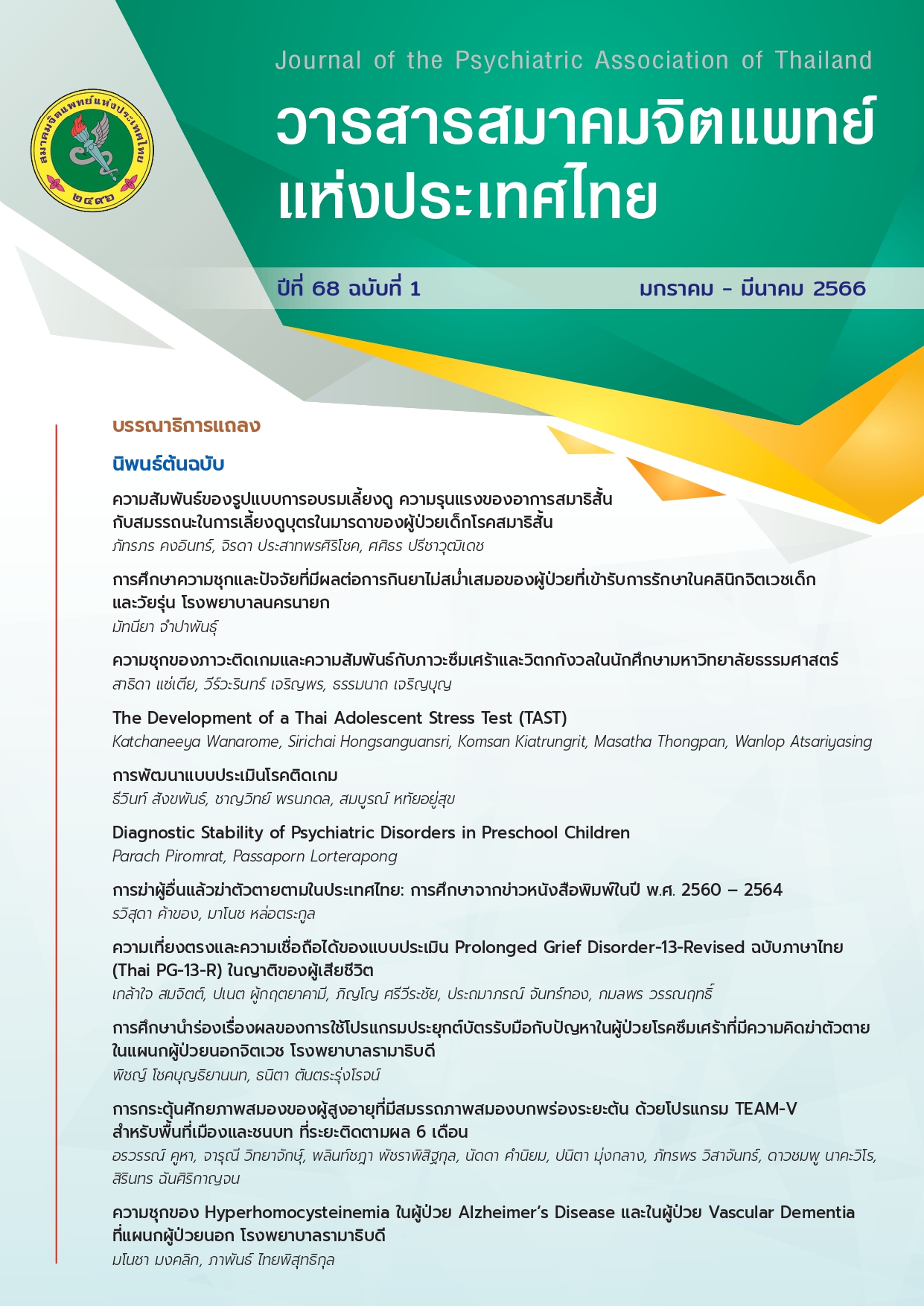The usage of coping card application in depressive patients with suicidal ideation in psychiatric outpatient setting of Ramathibodi Hospital: A pilot study
Main Article Content
Abstract
Objective: To perform the pilot study about utilization of coping card application in patients with major depressive disorder with suicidal ideation. Also, this research aims to study the safety and convenience of the application.
Methods: This study is a randomized controlled trial in 13 patients with major depressive disorder with suicidal ideation in outpatient department, Ramathibodi hospital. The data from the questionnaire for basic information of the participants, the patient health questionnaire (PHQ-9), the scale for suicidal ideation (SSI-Thai), and the depressive symptom index-suicidality (DSI-SS) were collected. The participants in the intervention group receive the instruction about the usage of coping cards application and deep breath exercise instruction while the participants in the control group receive the deep breath exercise instruction. After that, the PHQ-9, the SSI-Thai, and the DSI-SS, were assessed at 1 month and 4 months later. Median regression analysis was used to analyze the differences between the two study groups using all three time points.
Results: The mean score of PHQ-9, SSI-Thai2014 and DSI-SS continuously decreased from baseline to 4 months in both groups. The mean difference of the control and intervention group found that all except the PHQ-9 at 0 and 4 months and DSI-SS at 4 months, the mean scores from the control group are higher than in the intervention group without statistical significance. Most application users are satisfied with the application. They only use the application in emergency conditions and the coping statements are the main reason to use the application. There were no participants using the application for emergency calls. The most beneficial parts are the coping card and important picture. The suggestions for the improvement of application are a more comfortable interface, more easy-to-read fonts, and notification system.
Conclusion: the coping card application decreasing scores of depressed mood and suicidal thought without statistically significant. Most users are satisfied with the application and suggest improving the user interface and notification system.
Article Details

This work is licensed under a Creative Commons Attribution-NonCommercial-NoDerivatives 4.0 International License.
Articles submitted for consideration must not have been previously published or accepted for publication in any other journal, and must not be under review by any other journal.
References
World Health Organization. Suicide deaths occur in adolescents and adults of all ages[internet]. 2018 [cited 2021 May 19]. Available from: https://apps.who.int/gho/data/node.sdg.3-4-viz-2?lang=en.
Department of Mental Health. Annual report on suicide rate [internet]. 2020 [cited 2021 May 21]. Available from: https://www.dmh.go.th/report/suicide/stat_prov.asp.
Dong M, Zeng L-N, Lu L, Li X-H, Ungvari GS, Ng CH, et al. Prevalence of suicide attempt in individuals with major depressive disorder: a meta-analysis of observational surveys. Psychol Med 2019; 49:1691–704.
Pityaratstian N. Basic skills in CBT. Bangkok: Chulalongkorn University Press; 2022.
Wenzel A, Jager-Hyman S. Cognitive therapy for suicidal patients: current status. Behav Ther 2012;35:121-30.
Beck JS. Cognitive behavior therapy: basics and beyond. 2nd ed. New York: The Guilford Press; 2011.
Wang YC, Hsieh LY, Wang MY, Chou CH, Huang MW, Ko HC. Coping card usage can further reduce suicide reattempt in suicide attempter case management within 3-month intervention. Suicide Life Threat Behav 2016;46:106-20.
Propientong P, Tantrarungroj T, Prachason T. The use of coping cards in depressive patients with suicidal ideation. J Psychiatr Assoc Thailand 2021;66:217-26.
Hariman K, Ventriglio A, Bhugra D. The future of digital psychiatry. Curr Psychiatry Rep 2019;21:88.
de la Torre I, Castillo G, Arambarri J, Lopez-Coronado M, Franco MA. Mobile apps for suicide prevention: review of virtual stores and literature. JMIR Mhealth Uhealth 2017;5:e130.
Pauwels K, Aerts S, Muijzers E, De Jaegere E, van Heeringen K, Portzky G. BackUp: development and evaluation of a smart-phone application for coping with suicidal crises. PLoS One 2017;12(6):e0178144.
Kennard BD, Biernesser C, Wolfe KL, Foxwell AA, Craddock Lee SJ, Rial KV, et al. Developing a brief suicide prevention intervention and mobile phone application: a qualitative report. J Technol Hum Serv 2015;33:345–57.
O’Toole MS, Arendt MB, Pedersen CM. Testing an app-assisted treatment for suicide prevention in a randomized controlled trial: effects on suicide risk and depression. Behav Ther 2019;50:421–9.
Aguirre RTP, McCoy MK, Roan M. Development guidelines from a study of suicide prevention mobile applications (apps). J Technol Hum Serv 2013;31:269–93.
Luxton DD, June JD, Chalker SA. Mobile health technologies for suicide prevention: feature review and recommendations for use in clinical care. Curr Treat Options Psychiatry 2015;2:349–62.
Wang X, Ji X. Sample size estimation in clinical research: from randomized controlled trials to observational studies. Chest 2020;158:S12–20.
McCall WV, Batson N, Webster M, Joshi I, Derreberry T, McDonough A, et al. A psychometric cut-point to separate emergently suicidal depressed patients from stable depressed outpatients. Indian J Psychiatry 2013;55:283–6.
Holi MM, Pelkonen M, Karlsson L, Kiviruusu O, Ruuttu T, Heilä H, et al. Psychometric properties and clinical utility of the Scale for Suicidal Ideation (SSI) in adolescents. BMC Psychiatry 2005;5:8.
Lotrakul M, Sumrithe S, Saipanish R. Reliability and validity of the Thai version of the PHQ-9. BMC Psychiatry 2008;8:46.
Kittiteerasack P. Psychometric properties of the scale for suicide Ideation, Thai version (SSI-Thai Version 2014). J Psychiatr Ment Health Nurs 2015;29.
Beck AT, Kovacs M, Weissman A. Assessment of suicidal intention: the Scale for Suicide Ideation. Journal of Consulting and Clinical Psychology 1979;47:343-52.
Stanley IH, Hom MA, Christensen K, Keane TM, Marx BP, Björgvinsson T. Psychometric properties of the Depressive Symptom Index-Suicidality Subscale (DSI-SS) in an adult psychiatric sample. Psychol Assess 2021;33:987–97.
Suh S, Ryu H, Chu C, Hom M, Rogers ML, Joiner T. Validation of the Korean Depressive Symptom Inventory-Suicidality Subscale. Psychiatry Investig 2017;14:577-84.


